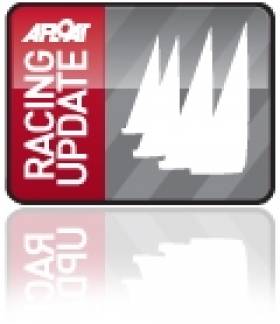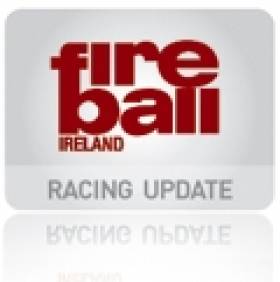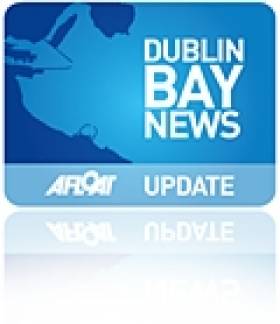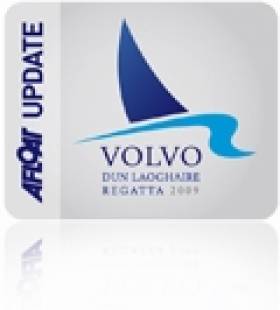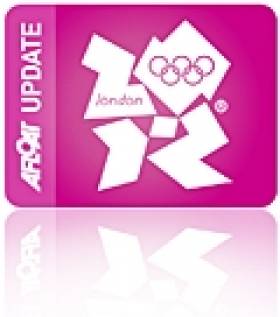Displaying items by tag: RIYC
#Irish Sailing – Foxall ready to step in to the history books, as Galway set for VOR arrival, Ben Duncan puts on an SB20 display in Tralee, Noel Butler and Stephen Oram Win Fireball Nationals, Barry Hurley wins first Round Rockall Race, an amazing last stretch performance gives Inis Mor Round Ireland victory, Kenefick retains Corinthian Quarter ton Crown, All the Royal Irish Regatta results and why its all over for the Volvo 70s in Galway. A Mermaid is battling on against the showers in a five hundred mile voyage from Foynes to Skerries.
Irish Fireball National Championships Results
#fireball – The 2012 Fireball National Champions are Noel Butler and Stephen Oram from Dun Laoire Motor Yacht Club. The pair sailed an excellent series to claim the title ahead of Simon McGrotty & Darrach Dineen (Skerries SC) and Kenny Rumball/David Moran (Irish National SS) reports Gareth Craig. Photos below by Gareth Craig.
The Irish Fireball Nationals, sailed this past Friday, Saturday, Sunday were certainly not short-changed in terms of available wind. Friday saw heavy conditions for the three races of the day with the fleet being taken off the water between races 1 and 2. Saturday saw a tired fleet come ashore after four races in challenging conditions but by Sunday the breeze had eased to produce what were described as “champagne conditions” for the last day.
Friday' results were a key element to the overall situation and being able to finish all three races was a significant building block in getting to a podium finish. Simon McGrotty & Darragh Dineen produced the best performance of the day to take two race wins, either side of a race win by Noel Butler and Stephen Oram. This left the Skerries combination with a 1pt lead on the Friday evening over Butler/Oram. Third place overall saw Ed Butler (Jnr) teamed up with recently selected Irish 470 Olympian crew, Scott Flannagan, three points adrift of 2nd place.
Saturday saw four races sailed and Butler/Oram put together a solid performance relative to their close rivals to effectively tie up the regatta with a day to spare. Counting a 2, 1, 3, 1 suite of finishes they opened up a huge gap on their rivals, most of whom carried at least one bad result on the day. The next best result for the day was that of Kenneth Rumball and David Moran who put together a 4, 3, 1 5 followed by Neil Spain and Francis Rowan who scored a 3, 4, 4, 10. However, in terms of total points this left them 20 points adrift of the leaders.
With the first discard coming into play on Saturday evening, the actual situation was as follows;
|
Irish Fireball Nationals (Sat evening) |
R1 |
R2 |
R3 |
R4 |
R5 |
R6 |
R7 |
Tot |
|
|
1 |
Noel Butler & Stephen Oram |
3 |
1 |
2 |
2 |
1 |
3 |
1 |
10pts |
|
2 |
Kenneth Rumball & David Moran |
21 |
5 |
3 |
4 |
3 |
1 |
5 |
21pts |
|
3 |
Neil Spain & Francis Rowan |
4 |
4 |
4 |
3 |
4 |
4 |
10 |
23pts |
Wind conditions eased for Sunday's proceedings and the final three races of the series were completed. Butler & Oram sailed the last day even though they effectively had the regatta sewn up.
McGrotty/Dineen came back from a dreadful Saturday (2 x 21pts) to post a 1, 4. Rumball/Moran scored a 4, 2 while Spain/Rowan's regatta came unstuck with a 21 in the last race, which undid all the good work of a 3rd in Race 8. Butler/Oram had a 9 and another first to close out the event with some authority. The nine was to become one of their discards, the other being a third.
|
Irish Fireball Nationals; Final Overall |
R1 |
R2 |
R3 |
R4 |
R5 |
R6 |
R7 |
R8 |
R9 |
Tot |
|
|
1 |
Noel Butler & Stephen Oram |
3 |
1 |
2 |
2 |
1 |
3 |
1 |
9 |
1 |
11pts |
|
2 |
Simon McGrotty & Darragh Dineen |
1 |
3 |
1 |
21 |
21 |
5 |
4 |
1 |
4 |
19pts |
|
3 |
Kenneth Rumball & David Moran |
21 |
5 |
3 |
4 |
3 |
1 |
5 |
4 |
2 |
22pts |
|
4 |
Neil Spain & Francis Rowan |
4 |
4 |
4 |
3 |
4 |
4 |
10 |
3 |
21 |
26pts |
|
5 |
Ed Butler (Jnr) & Scott Flannagan |
2 |
2 |
5 |
1 |
21 |
6 |
21 |
5 |
6 |
27pts |
The Silver fleet was won by Dave Coleman and Glen Fisher in 17th, followed by Mary Chambers and Brenda McGuire. The ladies applied discretion rather than valour to Friday's racing but finished all the remaining races of the weekend. Dave and Glen had a difficult day on Saturday but had other results just off the top tem. The Classic Trophy was not awarded.
Noel Butler offered the following additional oversight of the regatta;
Quite a few combinations flirted with the front end of the fleet and led races at different times. Frank Miller and Grattan Donnelly sailed a very consistent Friday to lie in 5th overall and their "counted" results showed a consistency that saw them finish in 8th overall. Michael Ennis and Marie Barry also led a race, lost the lead and regained it. Niall McGrotty & Neil Creamer, scored a 2nd to Butler/Oram in Race 7 and Noel admitted they only just caught the former combination in time. In some of the heavier conditions Michael Murphy and Alex Voye got their chance at the front and they secured two 2nd places in their set of results. In Race 8 an OCS was signalled and Butler/Oram and Butler/Flannagan went back. It afforded the former combination an opportunity to see how an Olympic-qualified crew works the boat around the course. Butler/Flannagan eventually got back to 5th in this particular race. From a rare trip through the fleet, as a consequence of going back at the start, Noel also confirmed that there was competition all around the course with individual battles going on right through the fleet.
The testing conditions over the three days put a premium on keeping boats together and among the casualties of the regatta were Luke Malcolm who suffered an exploding rudder stock and Louis Smyth who broke a jib halyard. Butler/Oram suffered no such trauma and were lending equipment to other competitors to keep them on the water. Meticulous maintenance does have its place in Fireball racing!
Race management by Harry Gallagher and Scorie Walls was of a very high standard, as their reputation dictates! Races were started promptly after the last finisher of the previous race and while the fleet was brought ashore on Friday for a period, when the wind eased they were sent back out again to race. All starts were under Blue Peter conditions and the start lines were set up with a laser-spotter for accuracy of length and at the request of the Class, a variable weather mark was used. This is a set up that was encountered at the European Championships in the Czech Republic in 2010. A second weather mark is available to the RO if the wind changes so that a true beat can be set for each windward leg. The RO has the independence to reset the weather mark without having to wait for the last boat to go around the old weather mark before it can be lifted. The irony of this weekend is that the breeze was reasonably steady so the benefit of this mechanism was not as significant as might be the case.
While the turnout of only 20 boats is of concern, there were some mitigating circumstances. Barry Hurley, who has been crewing with Andy Boyle, was racing double-handed around Rockall as part of Galway's festivities for the Volvo Ocean race. Andy Boyle himself was racing in the Round Ireland Race which had started the previous weekend and Brian Flahive was also in double-handed mode, finishing 2nd in the Round Ireland.
Howth have been very anxious to host another Fireball event after the very successful hosting of our Leinsters in 2010. They have excellent facilities and easy access to a very clean racing area, free of any significant commercial traffic.
At the same time across Dublin Bay, the Norwegian square-rigged tallship Statsraad Lehmkuhl was underway from her River Liffey berth at Sir John Rogersons Quay, where the 321" foot vessel had made a two-day visit to Dublin Port.
As the public boarded one of the largest tallships in the world, they were given a taste of what to expect a year from now, as the capital prepares to be the host-port of the final race-leg of the Tall Ships Races. The sailing spectacle was last held in 1998 and the high-profile event in August 2012 is expected to draw around 100 tallships.
Irish Sea Events Offer Entry Discounts
"The way this works is that the Clyde Cruising Club are offering a 25% rebate for boats from the 4 Dun Laoghaire Clubs (DMYC, NYC, RIYC, RStGYC) that enter the Brewin Dolphin Scottish series before the expiration of the early bird discount period which expires on April 22nd explained Dun Laoghaire event secretary, Ciara Dowling.
As a reciprocal arrangement the committee of the Volvo Dun Laoghaire Regatta are offering a discount of 50% from the full entry fee to all boats that enter both regattas. To avail of this, boats must register for the early bird entry fee in the Volvo Dun Laoghaire Regatta prior to 2 May 2011. Note the 50% discount will be applied to the full entry fee rate and not the early bird rate.
To avail of this arrangement for the Scottish Series contact the Brewin Dolphin Scottish Series office for details, [email protected] 0044141 221 2774.
To avail of this arrangement for the Volvo Dun Laoghaire regatta visit the event website at www.dlregatta.org or email [email protected]
The Scottish Series takes place from 27–30 May and the Dun Laoghaire regatta from July 7th–10th 2011.
In a further boost for Dun Laoghaire sailors heading north the feeder race from Bangor to Tarbert has been re-instated.
Troon and Largs Marinas are offering competitors berthing rate discounts around Scottish Series.
Competitors from Scotland coming to Dun Laoghaire are reminded that the entry fee to the regatta includes free berthing for the duration of the event.
The official Notice of Race and Online Entry are now available at www.dlregatta.org
Murphy Heading for Australian Regatta
The National Yacht Club's Annalise Murphy (Laser Radial) travelled to Australia last weekend for the Perth International Regatta http://www.perth2011.com/ which starts on the 16th of this month. The aim is to gain valuable experience at the venue which will host the December 2011 ISAF World Championships and which will be a vital qualifying event for the the 2012 London Olympic games.
Also heading for Perth is the Royal St. George's Ben Lynch in the high speed 49er dinghy.
After Perth, Annalise travels to Melbourne for the season's first ISAF World Cup event which will be run from Sandringham Yacht Club from 12-19th December. Annalise is currently ranked 20th Womens Laser Radial sailor and 1st under 21 in the World and is campaigning full time to represent Ireland in the 2012 London Olympic Games.
Top youth Laser Radial Sailor Ross Vaughan from the Royal North of Ireland YC has gone down as a training partner for Annalise together with her coach Rory Fitzpatrick.
Also taking part in the Perth Regatta are Irish 49er team of Ryan Seaton and Matt Mc Govern (Ballyholme YC) and Ross Hamilton from the RIYC, Dun Laoghaire.



























